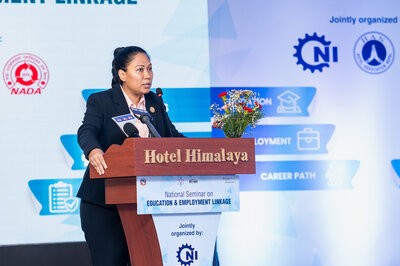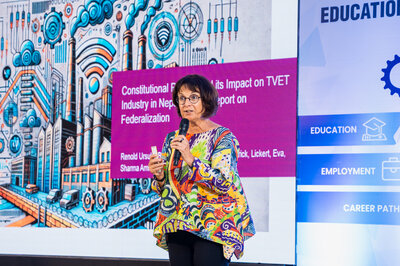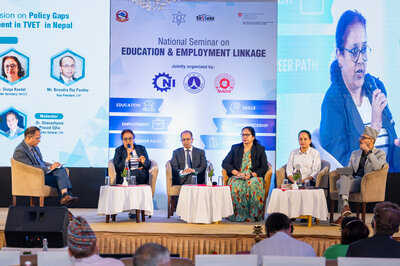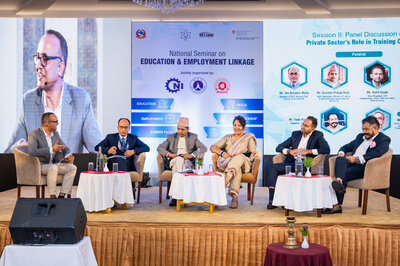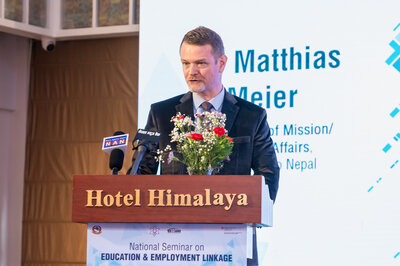On August 29, 2024, the National Seminar on Education and Employment Linkages, jointly organized by the Confederation of Nepalese Industries (CNI), Hotel Association Nepal (HAN), and the Nepal Automobiles Association (NADA), was held in Lalitpur. The event, supported by the Swiss-funded Enhanced Skills for Sustainable and Rewarding Employment (ENSSURE) Project, explored the challenges and opportunities for re-engineering Nepal’s Technical and Vocational Education and Training (TVET) system.
Key Highlights
The seminar highlighted positive progress in Nepal’s TVET sector. Some of the positive takeaways are detailed below, which include:
- Women graduates of apprenticeship program are 2.5 times more likely to find employment than those who do not have apprenticeships.
- Business Industry Associations are coordinating to execute the apprenticeship program and provide upskilling opportunities. Employers are participating in curriculum development and the private sector has invested NRS 90 million (CHF 0.59 million).
The seminar also acknowledged current challenges such as the fact that the TVET system in Nepal is not yet fully effective in providing skills and employment to Nepali youth due to a disconnect between education and the employment system. The TVET system needs re-engineering to bridge the disconnect. The event explored the challenges and opportunities for re-engineering Nepal’s TVET system.
Keynotes and Presentations
The seminar commenced with an inaugural address by Hon’ble Ms. Bidhya Bhattarai, Federal Minister of Education, Science and Technology. Two keynote speeches followed, which highlighted the broader issues surrounding TVET and employers’ engagement in Nepal, setting the context for the day’s discussions:
1.Prof. Dr. Ursula Renold, Chair of Education Systems, ETH Zurich, pointed out that industry in Nepal is not effectively involved in TVET, and looked at how Nepal can improve industry involvement and linkages. One of her key points was to create a TVET Industry Council to organize the industry sector and enable them to speak with one voice.
2. Ms. Sumana Shrestha, former Federal Minister of Education, Science and Technology highlighted that merely having representatives of the private sector in committees such as a Sector Skills Committee does not alone ensure good and proper collaboration and called for systemic reforms.
The seminar continued with five technical presentations which provided hard facts and key findings from empirical studies and best practices, both within and outside Nepal, on education employment linkages. These insights were further explored in the panel discussions. The opening and closing sessions re-reinforced the commitment from the major stakeholders, both from the world of work and the world of education, to collaborate on reforms in the TVET sector. The seminar also featured mini skills competitions and recognized industries committed to skills development through apprenticeship programs.
Seminar Takeaways
The Seminar concluded in an optimistic note with the following takeaways:
Government policies broadly acknowledge the importance of employer engagement in the TVET system; however, the specific role of employers remains unclear, and there is no mechanism in place to ensure their active participation.
The Constitution of Nepal emphasizes the importance of private sector participation for skills development. In line with this, other relevant government policies such as the enterprises promotion policy, labor laws, and education polices also have underscored the need for strong private sector participation in skills development. Similarly, long-term government plans such as the 16th Ten-year Plan and the TVET Sector Strategic Plan (TSSP) have not only highlighted the importance of private sector engagement but have set specific targets such as establishing 20 Sector Skills Committees under private sector leadership, increasing the share of Business and Industry Associations (BIA) in School Management Committees by 50 % and increasing the private sector participation in the CTEVT assembly by 50%.
CTVET bylaws and procedures also acknowledge the need for private sector participation at various stages of the curriculum value chain. This shows that there is broader recognition of the importance of employer engagement in the TVET system. However, the by-laws and procedures lack clarity on the specific roles, responsibilities and authority of the private sector in the training cycle. As a result, their participation remains superficial and voluntary, if at all, with no formal mechanism in place to ensure meaningful participation in shaping the TVET system or contributing to its value chain.
Nepal meets the pre-conditions for strong education and employment linkage
While the education-employment linkage is crucial for an effective TVET system, it remains elusive without certain conditions being met. Preconditions for this linkage include TVET programs that benefit industries, the presence of recognized private organizations, a sufficient number of companies willing to make financial commitments, and government recognition of the private sector's contributions, with a willingness to delegate some authority (BMZ, 1992). According to Prof. Dr. Ursula Renold, all these conditions are present in Nepal, albeit better coordination with the private sector is desirable. In fact, as mentioned above, she pointed out that the creation of a TVET Industry Council would enable the industry sector to organize itself better and provide it with a platform to come together with one voice. The 24-month Dual VET-Apprenticeship program has already proven beneficial for industries. Additionally, a sufficient number of industries in Nepal are well-organized into sectoral and cross-sectoral associations. These industries are ready to make financial commitments, and government policies broadly recognize the private sector's role in TVET. Furthermore, there is an intent in government policies to delegate some authority to the private sector.
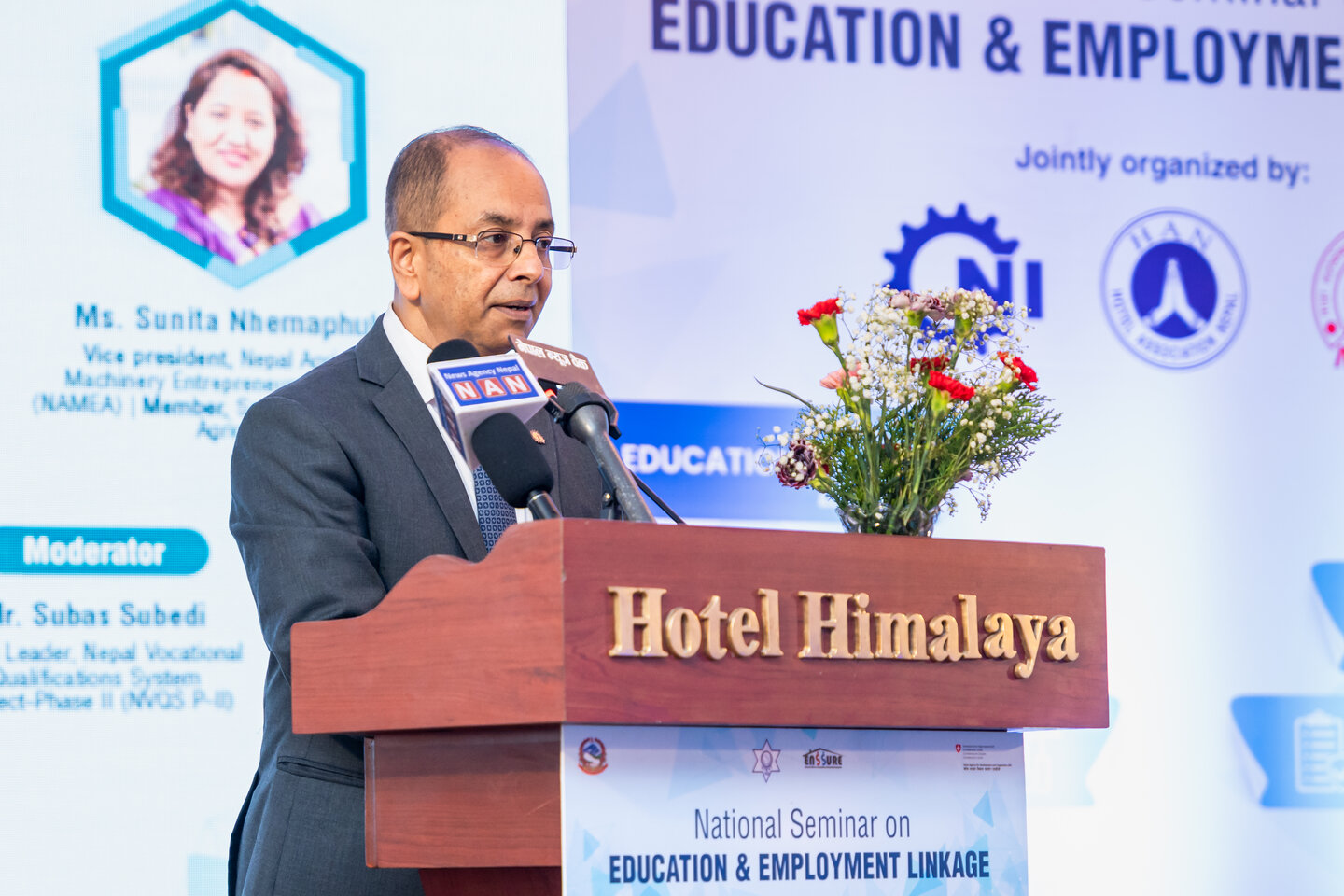
Dual VET-Apprenticeship is a proven model for stronger education and employment linkage
The ENSSURE Project has been promoting the Dual VET-Apprenticeship program since 2016. Currently, the 24-month pre-diploma level apprenticeship courses are being offered in eight occupations across Nepal. Within industries, during the first four months apprentices learn theoretical knowledge, and for the remaining 20 months they develop skills under the guidance of in-company trainers. Over the past eight years, more than 1,000 industries in Nepal have participated in the program, co-investing over CHF 1.5 million in incentives for apprentices. This figure would be considerably higher if the expenses for in-company trainers’ salaries, tools and equipment were accounted for. Industries are actively involved in hiring apprentices, providing work-based training, and participating in the assessment and evaluation process. These roles are recognized by the Apprenticeship Working Procedure, which is being replaced by stronger legal regulations under the Apprenticeship Bylaw. Industries benefit both in the short and long term: while the program helps reduce the skills gap, they face, they also experience significant productivity gains during the apprenticeship period. Research conducted by ETH Zurich shows that, on average, an industry gains a net productivity equivalent to NPR 110,000 (CHF 723.58) during a 20-month apprenticeship.
Six industry associations, three at the federal level and three at the provincial level, have joined hands with the project to promote the apprenticeship program. These associations have played a key role in encouraging broader industry participation. Strong industry engagement has improved the program’s efficiency and effectiveness, leading to increased youth enrollment, enhanced learning quality, and greater cost-effectiveness. The randomized control trail (RCT) on the apprenticeship program proved that labour market outcomes are better, particularly for women, after apprenticeship. While it showed that 50% more male graduates were employed than males who were not enrolled in the program, the positive effect for women was even better, with 2.5 times more female graduates finding employment in Nepal after completing the program.
Furthermore, this involvement has positively impacted program outcomes.
A tracer study found that only 12% of apprenticeship graduates are unemployed, and randomized controlled trials (RCT) by ETH Zurich confirmed that apprenticeship graduates are more likely to find jobs compared to those without apprenticeships.
In conclusion, the apprenticeship model has proven to be a win-win-win for Nepal, benefiting youth, industries, and the government by reducing the public investment burden as the majority of learning takes place within industries. Strengthening and formalizing the role of industries in curriculum development and updates could further enhance their engagement and make the program even more effective.
Sector Skills Councils (SSCs) and the TVET Industry Council can be effective tools for linking education and employment
Sector Skills Councils (SSCs) could be a powerful tool for linking education and employment. They can play a key role in providing policy advice and feedback to the government, generating and analyzing labor market data, developing skills standards and qualifications, designing curricula, and ensuring quality, assessment, and certification. SSCs have been highly effective in countries like India, Vietnam, and the Philippines. However, these committees have yet to become fully effective due to the absence of a legal framework, limited capacity to carry out their roles, a lack of funding mechanisms to sustain them, and challenges in establishing them as a unified certifying and awarding body across various ministries.
Prof. Dr. Renold proposed creating a TVET Industry Council. This council could coordinate TVET policies, define the rights and duties of industries in the TVET system, and help shape the industry’s strategy for TVET. It could also define the roles and responsibilities of all associations involved in TVET, advocate and negotiate with government authorities, provide strategic input, and promote dual VET apprenticeship programs, among other functions.
The stakeholders are committed to working together for policy reform
Stakeholders across the education and employment sectors widely recognize the urgent need for reform in Nepal's TVET system. The Minister of Education, who was the event’s chief guest, emphasized the importance of overhauling the TVET system. Similarly, former Minister of Education, Ms. Sumana Shrestha, highlighted the need to transform the system by granting more authority and responsibility to the private sector. Additionally, the three industry associations that organized the program pledged to continue advocating for stronger industry engagement in TVET. The chair of the parliamentary committee also voiced support for these efforts.
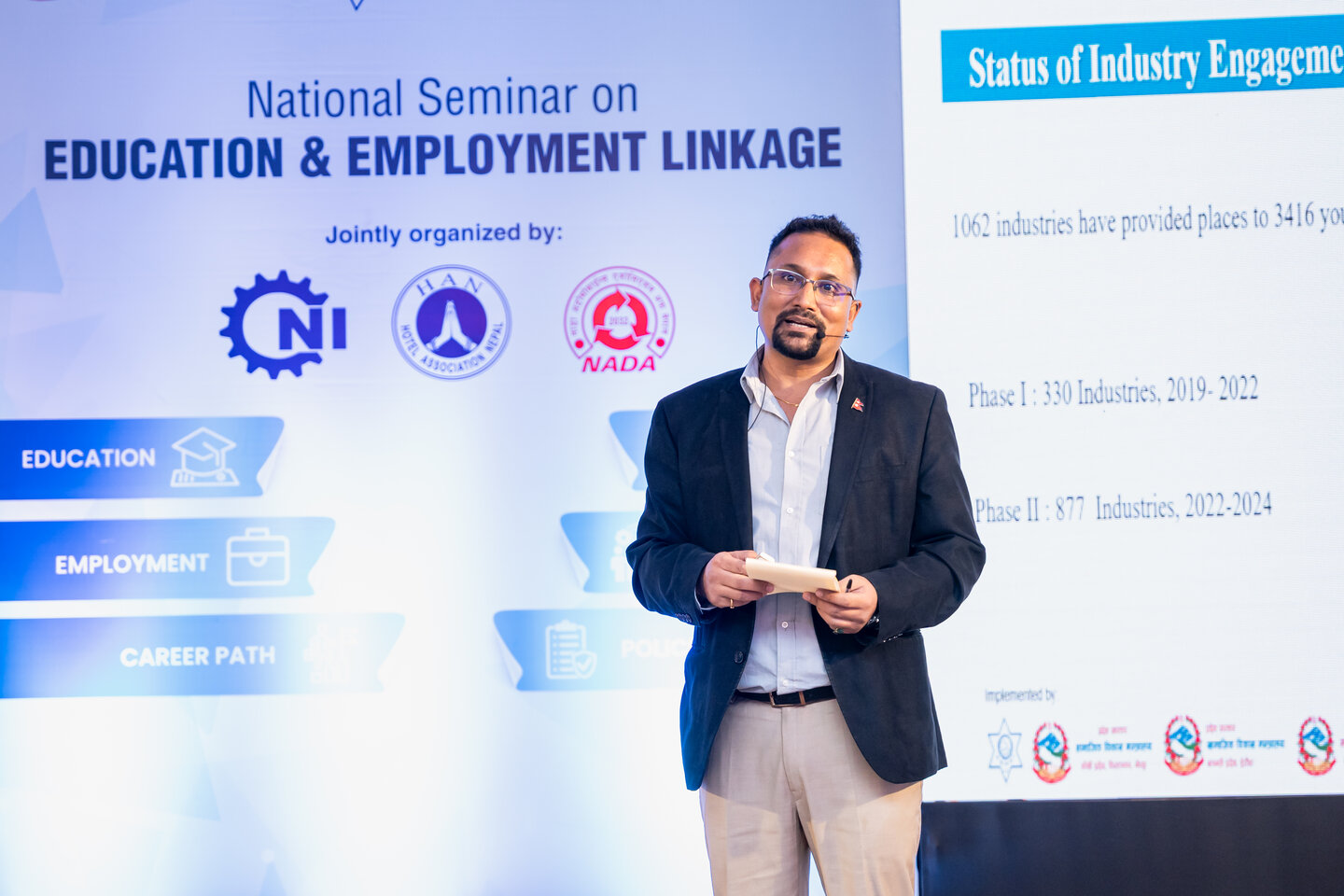
Recognition is important
Youth attraction to TVET programs in Nepal remains low, and dropout rates are high. Even within the apprenticeship program, which shows promising enrollment figures, significant dropout rates occur due to the absence of a well-defined career progression pathway. Although the Government of Nepal approved the Nepal Vocational Qualification Framework (NVQF) in 2019, TVET programs still often lead to dead ends, as the framework has yet to be fully operationalized. The growing demand for apprentices in industries is hindered by these high dropout rates, complicating efforts for industries to secure apprentices. If this trend continues, industries may gradually lose interest in the program. Therefore, it is crucial to operationalize NVQF. Additionally, both government and private sector efforts are needed to enhance the value of TVET certification, making it mandatory for skilled labor in specialized jobs in both sectors. Improving the social image of TVET is equally important for attracting and retaining youth. National-level skills competitions and participation in international skill competitions can help in this regard. Recognizing employers committed to skill development is also key to maintaining their engagement and encouraging others to invest in skills development. The seminar included mini skills competitions and gave awards to supportive employers as teasers for broader efforts to improve TVET. These elements should be embedded in the TVET system to attract more youth and industries.
Apprenticeship Champion Awards
Five industries were awarded an Apprenticeship Champion Award. Panchakanya Group Pvt. Ltd., Nepal Ekarat Engineering Pvt. Ltd., Arihant Multi Fibers Ltd., CG Moto Corp, and Airport Hotel were honored with the Apprenticeship Champion Award. This award recognized industries that actively support the apprenticeship program, prioritizing disadvantaged groups, including women, and consistently placing a high number of apprentices in their industries. Similarly, mini competitions were held among apprentices in the Diploma in Hospitality Management and the Automobile Industry, allowing seminar participants to appreciate and recognize the apprentices' skills. The winners of these competitions were also awarded during the seminar. Winner of the Apprentice Skill Competition: Automobile Engineering was Basanta Kumar Chaudhary, and winners of the Apprentice Skill Competition: Hotel Management were Rashmi Mukhiya and Rabina Katunjeli Rai.



